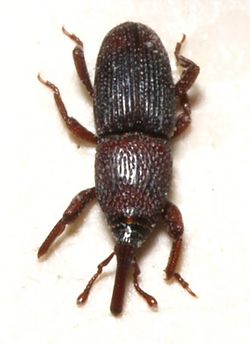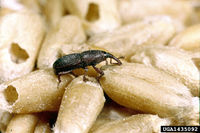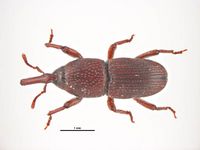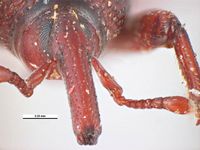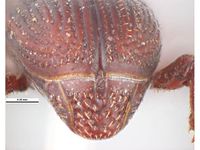Difference between revisions of "Sitophilus granarius"
| Line 1: | Line 1: | ||
| − | {{ | + | {{TaxLinks|LnkSitophilus}} |
{{LiteratureDB|{{PAGENAME}}|browse,products,benefialsN}} | {{LiteratureDB|{{PAGENAME}}|browse,products,benefialsN}} | ||
[[File:Sitophilus.granarius.jpg|250px|thumb|''Sitophilus granarius'' (click on image to enlarge it)<br/>Source: [http://commons.wikimedia.org/wiki/File:Sitophilus.granarius.jpg Wikimedia Commons]]] | [[File:Sitophilus.granarius.jpg|250px|thumb|''Sitophilus granarius'' (click on image to enlarge it)<br/>Source: [http://commons.wikimedia.org/wiki/File:Sitophilus.granarius.jpg Wikimedia Commons]]] | ||
| − | <font color="#800000">'''''Sitophilus granarius'''''</font> (Linnaeus) - (grain weevil) | + | <font color="#800000">'''''Sitophilus granarius'''''</font> (Linnaeus) - (grain weevil) |
| − | is a common and serious pest of stored cereals with a world-wide distribution. It has been known in Europe as a storage pest for thousands of years. All cereals are attacked, in particular rye and wheat. The larvae develop inside the grain and the development time from egg to adult lasts around 5 weeks. Control is done by fumigation or controlled atmosphere (low oxygen and high carbon dioxide) | + | |
| + | The weevil is a common and serious pest of stored cereals with a world-wide distribution. It has been known in Europe as a storage pest for thousands of years. All cereals are attacked, in particular rye and wheat. The larvae develop inside the grain and the development time from egg to adult lasts around 5 weeks. Control is done by fumigation or controlled atmosphere (low oxygen and high carbon dioxide). | ||
{{VN | {{VN | ||
|en=grain weevil<br/>granary weevil | |en=grain weevil<br/>granary weevil | ||
| Line 11: | Line 12: | ||
|pt=traça-dos-cereais | |pt=traça-dos-cereais | ||
}} | }} | ||
| + | The adult is around 4 mm long, dark reddish brown. It resembles ''[[Sitophilus oryzae]]'' and ''[[Sitophilus zeamais]]'' but is usually larger and the pronotum has spindle-shaped grooves, rather than small, round or oval punctures. In contrast to these 2 species, it is also unable to fly and spreads through infested grain. | ||
| + | |||
'''Synonyms:'''<br/> | '''Synonyms:'''<br/> | ||
''Calandra granarius'' | ''Calandra granarius'' | ||
Revision as of 14:34, 1 May 2015
| Literature database |
|---|
| 147 articles sorted by: |
| • year (recent ones first) |
| • research topics |
| • countries/regions |
| • products infested |
| • list of natural enemies |
Sitophilus granarius (Linnaeus) - (grain weevil)
The weevil is a common and serious pest of stored cereals with a world-wide distribution. It has been known in Europe as a storage pest for thousands of years. All cereals are attacked, in particular rye and wheat. The larvae develop inside the grain and the development time from egg to adult lasts around 5 weeks. Control is done by fumigation or controlled atmosphere (low oxygen and high carbon dioxide).
| Vernacular names | |
|---|---|
| • Deutsch: | Kornkäfer Schwarzer Kornwurm |
| • English: | grain weevil granary weevil |
| • Español: | gorgojo del trigo gorgojo de los graneros |
| • Français: | charançon du blé calandre du blé |
| • Português: | traça-dos-cereais |
The adult is around 4 mm long, dark reddish brown. It resembles Sitophilus oryzae and Sitophilus zeamais but is usually larger and the pronotum has spindle-shaped grooves, rather than small, round or oval punctures. In contrast to these 2 species, it is also unable to fly and spreads through infested grain.
Synonyms:
Calandra granarius
For details see the respective page in Wikipedia.
- Other images of Sitophilus granarius (IPM Images and PaDIL - click to enlarge)
